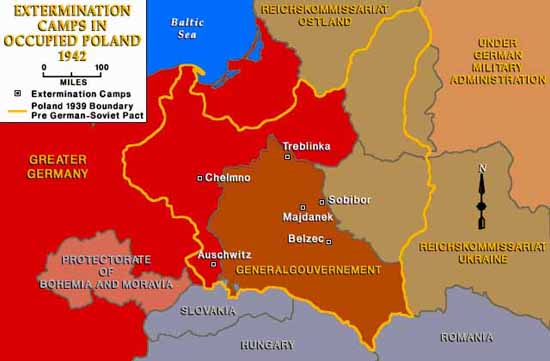History, the Holocaust and Poland
The government of Poland is sensitive to any references of Nazi death camps which operated within the territory of German-occupied Poland during the Second World War, as Polish death camps. They are quick to clarify that the death camps were German, merely situated in Poland. |
| Extermination camps were killing centers designed to carry out genocide. Between 1941 and 1945, the German Nazis established six extermination camps in German-occupied Polish territory - Chelmno, Belzec, Sobibor, Treblinka, Auschwitz-Birkenau and Majdanek. Both Auschwitz and Majdanek functioned as concentration and forced-labor camps as well as killing centers. An estimated 3.5 million Jews were killed in these six extermination camps as part of the "Final Solution." Other victims included Roma (Gypsies) and Soviet prisoners of war. |
But the quite simple fact is that Poland hosted more concentration, labour and extermination camps than any other occupied country of Europe. And of the three million Polish Jews that lived in the country at the time occupation took place, fully 90% perished in the years to follow; 2,900-million Polish Jews were systematically and horribly annihilated. The Third Reich had full knowledge that in installing death camps in Poland they could be assured that no organized popular dissent would occur.
"Most Poles considered the Holocaust as an event that in fact did not concern them", wrote Feliks Tych, editor of Memory: The History of Polish Jews Before, During and After the Holocaust. While the Final Solution's brutal efficiency rid Europe of most of its Jews, the Poles committed themselves as bystanders. It was not only Polish Jews who were annihilated in Poland, but Jews brought to Poland from other countries of Europe.
"The vast majority of Poles were indifferent or inactive. You can't expect most people to be heroes. This is normal", wrote Sebastian Rejak, Poland's envoy to the Jewish diaspora. But then there was a plenitude of Polish collaborators who were pleased to serve the Germans. And once the war was over, and Polish Jews who had somehow survived, returned to their Polish villages found resentment at their return and an unwillingness to restore their homes to them, now occupied by Poles.
Many returning Holocaust survivors, in fact, encountered far more than resentment. Their spirits were further violated when they were threatened, as though they had not suffered adequately awaiting their death in the extermination camps or labouring under violent duress for the Nazi war effort in he infamous munitions factories in work camps. Those returning survivors often found death awaiting them at the hands of Poles who refused to allow returnees the right to life.
Virulent anti-Semitism was the order of the day in Poland. But among the Poles were some who felt compassion and a moral need to resist the Nazi killing machine, who risked their own lives and those of their families to give shelter to Jews for the duration of the war. Some of them became victims themselves when they were betrayed by other Poles who brought the killers of the Nazi SS to the places sheltering Jews.
One such family lived in Markowa, Poland, Jozef and Wiktoria Ulma, who sheltered eight Jews on their farm. Wlodzimierz Les, a member of the Polish collaborationist Blue Police informed German military police, who killed the Ulmas and their six children along with the eight Jews who had found protection with the family. The Ulmas knew the penalty that would be exacted, but they followed their moral compass. In total an estimated 1,500 Poles in south-east Poland courageously sheltered several thousand Jews.
It has been estimated that the actions of over 200,000 Poles wee responsible for saving the lives of 50,000 Jews in Poland. Some took inspiration altruistically, others demanded to be paid for expenses they incurred in the process, while others were focused on achieving worthwhile profits from their endeavours. But 6,000 Poles have been recognized by Yad Vashem as "righteous gentiles", far exceeding in numbers any other Nazi-occupied European nationals.
That set against other historical accounts of wretched realities of the period when in 1941 a state sponsored campaign demonizing and marginalizing Polish Jews resulted in a pogrom in the northeastern town of Jedwabne, then under Nazi occupation. The town had been equally divided by Jews and by Catholic Poles; 1,600 of each. A mob of Poles said to have been incited by the Germans packed several hundred Jews into a barn and set it afire. Other Poles living in nearby villages came along to cheer.
Polish performance artist Rafal Betlejemski burning down a barn to commemorate the Jedwabne pogrom. Reuters
"This was a particularly cruel crime. It was justified by nothing. The victims were helpless and defenseless."
"For this crime, we should beg the souls of the dead and their families for forgiveness. This is why today, as a citizen and as president of the Republic of Poland, I apologize."
President Aleksander Kwasniewski, July 10, 2001
0 Comments:
Post a Comment
<< Home